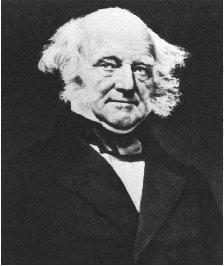Martin Van Buren
James C. Curtis

THE inauguration of Martin Van Buren on 4 March 1837 would long live in the memory of his contemporaries. The thousands who jammed Washington's avenues had come not so much to greet their new leader as to catch a final glimpse of the departing president, Andrew Jackson. They stood respectfully while the new president read his inaugural address and took the oath of office. As the inaugural party began its descent from the platform, the crowd unleashed a thunderous ovation "such as power never commanded, nor man in power received." "For once," recalled Senator Thomas Hart Benton, "the rising was eclipsed by the setting sun."
No one was more keenly aware of the significance of this transition than Martin Van Buren himself. He regarded Jackson as the last of the great revolutionary heroes. "I feel that I belong to a later age," Van Buren told the inaugural crowd, "and that I may not expect my countrymen to weigh my actions with the same kind and partial hand." Within weeks an unprecedented economic depression would cause Van Buren's countrymen to judge him harshly. Historians have been equally severe in their assessment. Depression victim though he would become, Martin Van Buren was superbly qualified for the White House.
More than any other statesman of the age, Van Buren devoted himself to the perfection of party politics grounded on principle and maintained by discipline. His career in both state and national government exemplified a professionalism that would shape the modern two-party system. If Andrew Jackson was the symbol of a political renaissance in the United States, Martin Van Buren was its chief architect and prime beneficiary. Lacking prestigious family connections, martial fame, or substantial wealth, he worked within the party to gain advancement. He was the first professional politician to become president.
BIBLIOGRAPHY
Elisabeth H. West, ed., The Calendar of the Papers of Martin Van Buren (Washington, D.C., 1910), provides an introduction to the rich collection of Van Buren's papers at the Library of Congress; the papers are the most important source on Van Buren's presidency. James D. Richardson, ed., A Compilation of the Messages and Papers of the Presidents 1789–1897 , 10 vols. (Washington, D.C., 1896–1899), includes Van Buren's addresses to Congress and many important state papers. Donald B. Cole, Martin Van Buren and the American Political System (Princeton, N.J., 1984), is an excellent biography.
Edward Pessen, Jacksonian America: Society, Personality, and Politics, rev. ed. (Homewood, Ill., 1978), provides a sophisticated overview of antebellum America. Richard P. McCormick, The Second American Party System: Party Formation in the Jacksonian Era (Chapel Hill, N.C., 1966), is a masterful account of party formation. Lee Benson, The Concept of Jacksonian Democracy: New York as a Test Case (Princeton, N.J., 1961), is a quantitative analysis of New York politics that suggests the crucial relationship between local and national party activity. James C. Curtis, Andrew Jackson and the Search for Vindication (Boston, 1976), provides critical insights into Jackson's presidency and the troubled political legacy that Van Buren inherited.
James C. Curtis, The Fox at Bay: Martin Van Buren and the Presidency, 1837–1841 (Lexington, Ky., 1970), and Major L. Wilson, The Presidency of Martin Van Buren (Lawrence, Kans., 1984), study Van Buren's single term in office. Reginald C. McGrane, The Panic of 1837: Some Financial Problems of the Jacksonian Era (Chicago, 1924), although dated, is still the best brief introduction to the financial collapse that dominated Van Buren's presidency. Peter Temin, The Jacksonian Economy (New York, 1969), challenges long-standing assumptions about Jacksonian finance and provides a thoroughly modern quantitative explanation for the Panic of 1837. John A. Garraty, Silas Wright (New York, 1949), neatly summarizes Wright's career but deemphasizes the senator's disillusionment with official economic policy during the Panic of 1837. Charles G. Sellers, James K. Polk, Jacksonian, 1795–1843 (Princeton, N.J., 1957), is an invaluable guide to congressional maneuvers during Van Buren's presidency.
Robert G. Gunderson, The Log-Cabin Campaign (Lexington, Ky., 1957), captures the flavor of the political rough-and-tumble but lacks analytical rigor. John C. Fitzpatrick, ed., "The Autobiography of Martin Van Buren," in Annual Report of the American Historical Association for the Year 1918 , vol. 2 (Washington, D.C., 1920), was written during Van Buren's retirement; the former president makes perceptive comments on political development but does not carry the narrative beyond 1835.
Also see John Niven, Martin Van Buren: The Romantic Age of American Politics (New York, 1983).
Marvin E. Fox